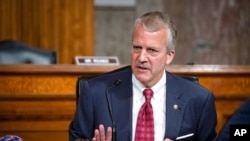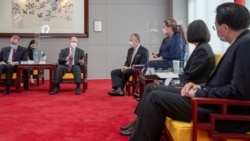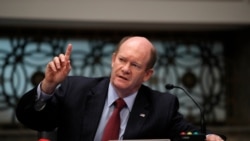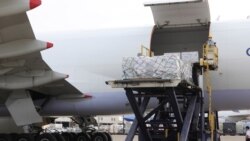A U.S. senator who sits on the Armed Services Committee is warning a violent, military takeover of Taiwan by Beijing would markedly change the world order, and he is calling on world leaders to support democratic Taiwan.
Taiwan is being threatened with extinction by “an authoritarian government of immense power, ambition and appetite,” said Dan Sullivan, a Republican senator from Alaska.
Taiwan, Sullivan said, is not “some peripheral sideshow in global great power competition. Rather, it is the front line between freedom and tyranny, like West Berlin during the height of the Cold War.”
Sullivan spoke at the International Republican Institute’s annual Freedom Award ceremony held in Washington this week. He is chair of the IRI.
In an interview with VOA on the sidelines of the event, Sullivan said he watched the situation in Hong Kong closely and saw how the rule of law, freedom of speech and association, and free elections have largely disappeared since Beijing took control of the territory.
Those developments are widely seen as violating China’s earlier promises to let Hong Kong maintain its way of life for 50 years from the time of the territory’s return to Chinese governance in 1997.
“Part of my role as an American elected official who cares about these issues is to make statements saying, 'Don’t view Hong Kong as a precedent that you now are going to use in other places, like Taiwan,’ ” Sullivan told VOA.
“It is our view that the unification [of Taiwan and China], if it’s going to happen, needs to be done peacefully,” he said. “That’s in the law, and it’s important for people to recognize that this isn’t just some outpost in the Pacific. This is, in my view, one of the front lines of freedom, the way West Berlin was during the Cold War.”
US policy on Taiwan
Sullivan stressed that the Taiwan Relations Act, passed by the U.S. Congress in 1979, explicitly states “the United States will consider any effort to determine the future of Taiwan by other than peaceful means … a threat to the peace and security of the Western Pacific and of grave concern to the United States.”
“We’re a country that’s ruled by law, that’s what we’re required to do,” said Sullivan, who also served as a Marine infantry officer deployed to the Taiwan Strait in the 1990s, during a time when Beijing was conducting provocative missile tests close to Taiwan.
“With Democrat and Republican senators, this administration, the previous administration, support for Taiwan is rock-solid and growing,” Sullivan said. “And I think that’s important as well.”
US support for Taiwan
Chris Coons, a Democratic senator representing the state of Delaware, serves on the Senate Foreign Relations Committee. In June, he traveled to Taiwan, along with Sullivan and another Democratic senator, Tammy Duckworth of Illinois, to deliver 750,000 vaccines in a show of solidarity and what Coons called U.S. commitment to the people of Taiwan.
“There are some countries that question whether the United States will come to the aid of our friends in Taiwan. This is a moment [when] we thought it was urgent and important for us to make clear that we intend to do so,” Coons said at the vaccine delivery ceremony in Taipei.
Asked by VOA how Washington should respond to repeated shows of force by Beijing close to Taiwan, Coons provided a written statement saying the United States should continue to oppose unilateral actions taken by China to undermine the stability of the Taiwan Strait and the Indo-Pacific.
“We also must do more to strengthen our competitive posture with regards to China here at home by sending to President [Joe] Biden’s desk the U.S. Innovation and Competition Act, which we already passed through the Senate on a bipartisan basis,” he wrote in an email response to VOA’s questions.
Coons said the legislation would allow for “significant investments that will help strengthen Taiwan and other partners in the Indo-Pacific that are doing their best to defend democracy and stand up to an increasingly assertive China.”
Earlier, Coons said the bill was intended to “more tightly weave together the open societies, the democracies of the world” and that it “specifically recognizes the strategic importance of the U.S.-Taiwan relationship.”
“Support for Taiwan’s free market democracy remains strong here in the U.S. Congress, and the Biden administration has taken calibrated steps to deepen ties with Taiwan consistent with both the one-China policy and the Taiwan Relations Act,” Coons wrote.
Deepening ties?
The U.S. government under former President Donald Trump took significant steps to deepen ties with Taiwan, including sending high-level health and trade officials to Taipei and lifting restrictions put in place decades earlier that forbade official exchanges between U.S. and Taiwan for fear of angering Beijing.
The Biden administration has taken additional steps, including U.S.-Taiwan trade and investment talks that were launched in June, the delivery of nearly a million vaccine doses, and the approval of a large-scale arms sale in August.
Derek Mitchell is president of the National Democratic Institute, another Washington institution, like IRI, with a mission to advance the cause of democracy and freedom. Asked if support for Taiwan was indeed bipartisan, “rock-solid and growing,” as Sullivan put it, his response was “absolutely.” Support for Taiwan, he said, is coming from “left, right and center.”
“There’s a respect for what Taiwan has achieved,” he said in a phone interview with VOA. Taiwan’s ability to fend off the coronavirus while maintaining its democratic system with a strong commitment to social welfare has gotten the world’s positive attention and made Americans and people from other countries generally more aware of what Taiwan has offered the world in terms of political and economic development.
Mitchell, who served in both the Clinton and Obama administrations as a Pentagon official, also pointed out Taiwan’s unique position in the strategic thinking of the U.S. and other countries.
“The crimes against humanity that are occurring in Xinjiang, the violation of essentially treaty obligations in Hong Kong, those are very, very important to the United States, but Taiwan was always a somewhat different [entity],” he said.
Chinese military action
Like Sullivan, Mitchell said the Taiwan Relations Act is “explicit about if there were a military action, it would be a grave concern to the United States.”
“The Pentagon has always watched [the situation] very closely and planned for scenarios related to potential contingency in the Taiwan Strait and towards Taiwan,” he said, noting that the leaders of the Communist Party who are running China now have failed to take the international community’s perception of Taiwan’s unique position into account.
In their view, he said, “this is all about internal affairs, and they have essentially drummed into the heads of the Chinese that they’re victims of a legacy of colonialism, Japanese imperialism, Western perfidy and containment. That’s what they’ve taught themselves, so they don’t see the difference.”
Outside China, he said, “there’s now a broader community that sees Taiwan as not just about cross-strait matters, but [having] implications for broader national security, international security,” which has everything to do with “competition from China when it comes to norms and values in the international system – democracy versus autocracy.”
Speaking to an international audience at the Freedom Award ceremony on Tuesday, Sullivan called for solidarity to sustain the democratic spirit and practice as seen in Taiwan — and elsewhere.
“Now is the time for the leaders of all democracies to get off the fence, and for the free world to stand together to make sure that authoritarian aggression will fail in the 21st century, just as it ultimately failed in the 20th.”
Asked if Washington was prepared to send troops if Beijing invaded Taiwan, Sullivan said that remained to be seen.
"That’s something that’s ambiguous right now, but I think we as a nation, and other nations, need to be ready,” he said.








